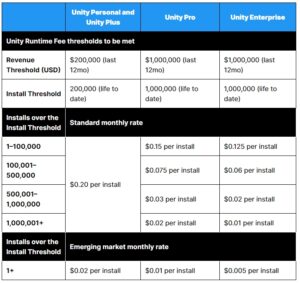
Unity has been struggling with its public and corporate relations over the course of 2023, first with multiple rounds of mass layoffs that cut at least 900 total workers, all after it hiked developer fees, spent $4.4B to buy a monetization company, and continued to lose money every quarter. Oh, and let’s not forget the time last year when Unity CEO John Riccitiello said that game devs who don’t bake monetization tricks into their game design are “fucking idiots,” then called everyone who had the temerity to quote him in full context “clickbait.”
Game dev eyebrows are inching toward the ceiling again this week as Unity has announced yet another new way to leech even more money from games using its engine.
“We are introducing a Unity Runtime Fee that is based upon each time a qualifying game is downloaded by an end user,” the company says. “We chose this because each time a game is downloaded, the Unity Runtime is also installed. Also we believe that an initial install-based fee allows creators to keep the ongoing financial gains from player engagement, unlike a revenue share.”

There are four tiers of fee for two different groups: one pair for games that made under $200K in the last year and have 200K lifetime game installs, and one pair for games that have made $1M in the last year with $1M lifetime game installs. Lest you think that means it’s cheaper for indies, no; the flat fees are actually significantly more expensive for the smaller devs, with deep volume discounts for major companies.
There’s another discount on offer for developers who inject Unity services like “Unity Gaming Services or Unity LevelPlay mediation for mobile ad-supported games” into their titles, so you can see exactly where this is going.
Unity Create president Marc Whitten told GameDeveloper.com point-blank that its goal here is to “make more money so that [it] can continue to invest in the engine” and “better balance the value exchange” between Unity and game developers. He also admitted that the studios to which Unity had pitched the new fees weren’t thrilled with the situation, but clearly it’s going ahead anyway. Whitten further claims that the “a large majority of Unity Editor customers are currently not paying and will NOT be impacted by this change,” which seems to be a bit of wordplay meant to limit indies to games with under 200K lifetime installs and does not address the small developers being asked to hand over another 20 cents per install.
Gamedev social media is… well, I won’t say rioting because the feedback is more like cold rage, as indie and mid-size teams do the math, point out charity bundles will go extinct, object to the bait-and-switch licensing terms under which many of have been toiling for years already, encourage studios to switch to Unreal (complete with tutorials), and beg players to stop installing their games.
This morning @unity sent a powerful message to all mobile game developers, and that message is ‘switch to Unreal, and do it immediately’. https://t.co/EeS46DWsiM
— Damion Schubert – @ZenOfDesign.com on bsky (@ZenOfDesign) September 12, 2023
Ok because I'm sure a billion people are doing the same math right now, this is what @unity 's brilliant new pricing will cost you per month / per year at the various tiers.
FUCKING LOL
(here's the google spreadsheet if you want to do your own math)https://t.co/bmZuKPRnrx pic.twitter.com/2t2jnrmHml
— Mike W (@gekido) September 12, 2023
Epic Games’ Tim Sweeney has been fairly quiet on the upheaval in the engine industry, given that Unreal stands to gain quite a bit from Unity’s overreach; thus far, he’s merely clarified that Epic can’t unilaterally renege on Unreal devs’ licenses mid-development.
Yes, it’s perpetual, and there are more recent improvements in the license (e.g. Epic can’t terminate a license even for breach or non-payment). Goal is to put the EULA contractual terms on par with the custom terms negotiated by the most powerful publishers.
— Tim Sweeney (@TimSweeneyEpic) September 12, 2023















